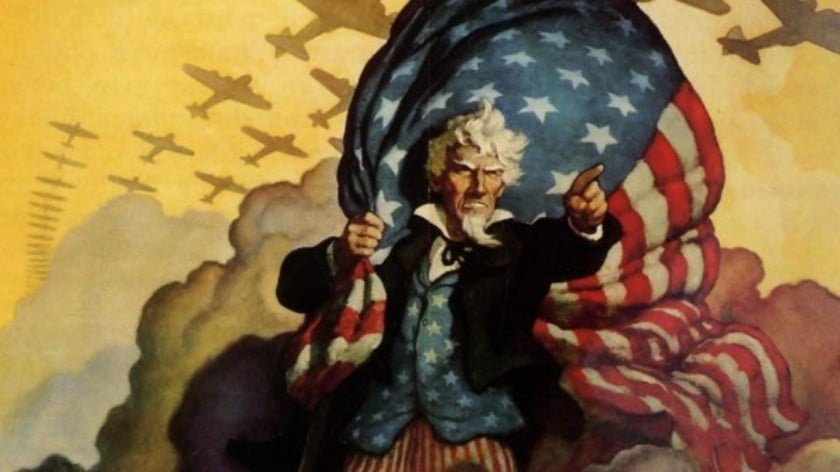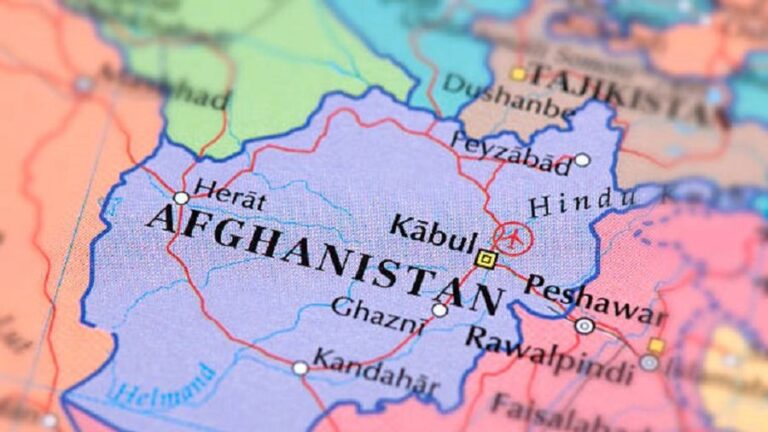The Mystery of American Power
Probably the single most important political fact about the modern world has been the steady rise of the United States of America. From a geopolitical point of view, the United States really is in a class of its own. While the Soviet Union might have rivaled the U.S. militarily, and while China and the European Union may be comparable economic giants, no other nation comes even close to having America’s combination of economic, diplomatic, military, cultural, and, increasingly important, surveillance power.
At least since the Second World War, there has been a veritable cottage industry of books predicting America’s supposedly inevitable decline, due either to the myth of American “exceptionalism” or to imperial hubris. In actual fact, one is struck at how steadily America has maintained its global share of power. Despite their economic recovery in the postwar years, the decline of Western Europe and Japan has in fact proved a more fundamental tendency. Russia has only partially recovered from the collapse from the Soviet Union. After decolonization – the collapse of the overseas European empires – in fact virtually none of Third World has been able to organize themselves as influential actors (“Brazil is the country of the future and always will be,” De Gaulle is supposed to have said.) Only capitalist China, it seems, will have the organization, intelligence, and sheer size to decisively overtake the United States economically.
America’s rise began from rather humble beginnings as a string of British colonies, peopled largely by English and other north-west European stock, along the eastern North-American seaboard. A striking fact for me: the U.S., born in 1776, is younger than my village church. At the time of independence, the country was inhabited by less than 3 million people.
America has risen thanks to a winning exponential formula right from the beginning. Already in a famous essay written in 1751 (Observations Concerning the Increase of Mankind), Benjamin Franklin was computing that thanks to the economic ease in raising children in America “our people must at least be doubled every twenty years.” Franklin could also already foresee that the free, northern colonies of Anglo-America must overtake the less dynamic slaver colonies of the South:
The Whites who have slaves, not labouring, are enfeebled, and therefore not so generally prolific; the slaves being work d too hard, and ill fed, their constitutions are broken, and the deaths among them are more than the births; so that a continual supply is needed from Africa. The Northern Colonies having few slaves increase in Whites. Slaves also pejorate the Families that use them; the white children become proud, disgusted with labour, and being educated in idleness, are rendered unfit to get a Living by industry.
By simply doing the math, Franklin could also foresee that Anglo-America would demographically overtake England and become a great power within a century (although he did yet imagine that this great power would actually be outside the British Empire):
Thus there are supposed to be now upwards of One Million English Souls in North America, (tho tis thought scarce 80,000 have been brought over sea) . . . This million doubling, suppose but once in twenty-five years, will in another century be more than the people of England, and the greatest Number of Englishmen will be on this side the water. What an accession of Power to the British empire by the Sea as well as Land!
Franklin’s predictions were remarkable. The colonial and then U.S. population did in fact double roughly every 25 years between 1750 and 1870. The population then doubled at a slower place, between 1870 and 1905 (35 years), and 1905 and 1960 (1960). The population is projected to double again between 1960 and 2030 (70 years) to 360 million.
By way of comparison, the population of most European countries doubled or tripled throughout the course of the entire nineteenth century. That of France, by far the largest in Western Europe, actually stagnated despite the Industrial Revolution, somewhat mysteriously. Many blame the Napoleonic Code’s mandatory division of inheritances among children and the French’s bourgeois spirit, preferring to “play it safe” by having few children. In any event, we can never emphasize the reality and importance of France’s relative decline: from being the leading and even culturally hegemonic Western-European state from the late Middle Ages right up to nineteenth-century, to merely one great power among many, and by no means the most powerful one, perpetually vulnerable to German invaders and fickle Anglo-Saxon allies. Demographics certainly is a big chunk of destiny.
All this begs the question: why has America been so successful? I do not claim to have all the answers, but I want to suggest a few possibilities.
America is, or was, above all a nation of European race and Anglo-Saxon culture. Late-medieval European civilization had already been remarkably dynamic and expansive, evident in its technological inventions, its military conquests (the Holy Land, Iberia), its explorations (the Vikings being the first discoverers of North America), trading routes, and its general development and peopling of the European landmass, with the foundation of innumerable new towns and settlements.[1] The Middle Ages marked the gradual movement northwards of civilization and technologies into lands which, prior, had been considered too climactically harsh and cold to sustain anything other than barbarism.
The “European Miracle” or “Great Divergence” between the West and the Rest is also somewhat mysterious. Suffice it to say that Europe became remarkable significantly before the Renaissance. The Europeans, divided in innumerable principalities and city-states, were animated by a enterprising spirit of conquest, trade, exploration, and invention. Hence, it was Europeans with their ships and steel, who rediscovered and conquered America, and explored and conquered much of the rest of the world. One is still astonished to see such small nations – by global comparison – as Portugal, Spain, the Netherlands, England, and France circumventing entire continents and bringing vast empires to heel.
The United States was however not merely founded by Europeans, but in particular by the English, who have the distinction of having been one the most dynamic and economically successful of European nations. England, blessed with mostly harmlessly small Celtic neighbors and a crucial little expanse of water between itself and the Continent (a mere 33 kilometers between Dover and Calais!), could develop in relative security develop in a most unique direction. Whereas virtually all European principalities developed, by geopolitical necessity, into military monarchies, England was free to develop into a purely mercantile and naval power.
Whereas political survival on the mainland depended on the state’s coercive ability to raise the men and taxes necessary to a large army, in England this depended instead on the maintenance of a large navy, which itself required an advanced trading economy. The American Founding Fathers were acutely aware of the role of war in the development of Continental despotism and self-consciously made their republic into a counter-model.
English and Anglo-American society were then uniquely pacific (I speak of domestic affairs) and based on law and commerce, relative to Continental Europe. These societies were also uniquely individualist. This seems to have driven the dynamism of these societies: people were uniquely mobile, they could seek out profitable professions, professions which interested them and/or which they excelled at (both of these are great motivators), and business could develop with great confidence in the legal system. All this seems to have allowed for a uniquely Anglo-Saxon confidence in enterprise and experimentation, rather than, as in many traditional societies, individuals merely being invited to stay in their rut.
As Franklin suggests, economic prosperity and individual free choice appear to have driven America’s steady and exponential demographic growth. America was more economically dynamic than other European settler-societies, such as French-Catholic Québec (although there was massive demographic expansion here too), Brazil (a slaver society to an even greater degree than the American South), or Spanish America in general (from Mexico, with conquistadors ruling over miserable indigenous and Mestizo masses, to Spanish-Italian-Amerindian Argentina). America’s society of middle-brow pioneers proved more expansive.
The spirit of enterprise is even visible in the British model of imperialism, which was often driven by individual initiative and profit, rather than grand political initiatives. The most spectacular example of this is the British East India Company, with imperial rule following profitable trade routes, rather than the other way around. (This is in stark contrast, for instance, to Adolf Hitler’s abortive empire in Eastern Europe, which though theoretically modeled on the British precedent, in fact was based on political and ideological imperatives, rather than economic viability.)

Another uniquely American phenomenon: the free popular adherence to religion. Whereas in most of the world, religion was passively handed down by the previous generation and often imposed in a top-down way by a state-sanctioned monopoly, in the U.S. individuals were free to join or found innumerable sects. One is surprised and struck to find, in a such an advanced country, so many religious revivals. Yet, the religious – with their regular meetings and pious enforcement of social norms – often have many children and tend to outbreed their atheist counterparts. We recall: the Amish and Mormon populations double every few decades (the Mormon founder Brigham Young, admittedly polygamous, had 56 children). Free adherence to the Protestant sects has also motivated a tremendous amount of idealism in American history, particularly visible among the Puritans and Quakers in the North. Religion too has contributed to American dynamism.
If I were to summarize the roots of American power, I would say this is due to the planting of Anglo-European civilization in the vastness of North America, no longer being cramped by the divisions and smallness of Europe (e.g., the State of Utah alone is larger than the island of Great Britain). Thus could dynamic potential of English culture be actualized at a truly continental scale, with the potential to even dominate the European continent itself (as Tocqueville foresaw). And, as John Jay famously observed in Federalist no. 2, the United States, unlike Europe, would be united in one ethno-cultural group:
With equal pleasure I have as often taken notice that Providence has been pleased to give this one connected country to one united people–a people descended from the same ancestors, speaking the same language, professing the same religion, attached to the same principles of government, very similar in their manners and customs, and who, by their joint counsels, arms, and efforts, fighting side by side throughout a long and bloody war, have nobly established general liberty and independence.
There were of course political contingencies in all of this. Had eighteenth-century France defeated Great Britain in the numerous wars on the seas, North America might be French-speaking today.
The Founding Fathers succeeded in the delicate operation of uniting the thirteen colonies into a federation. In fact, the Antebellum United States was quite fragile, the Founders having never really decided the issue of whether ultimate sovereignty resided in the states or in the federation. As ever, the free surrender of sovereignty by independent states is a rare and difficult affair. In the event, Lincoln’s armies decided the matter, thus establishing federal supremacy (on the back of a highly-idealistic appeal to abolish slavery) once and for all.
We can only speculate how North America had developed if the country had been split into northern United States and a southern Confederate States. There likely would have been a hostile stand-off, like that between India and Pakistan. As in Europe, the countries might have become more prone to violate the rule of law and adopt libertidical and arbitrary measures in the name of national security. Certainly, Anglo-America’s domination of Europe would have been impossible in these circumstances and a more aristocratic and martial culture might have been sustained in the South.
The uniqueness of Anglo-American culture is also evident in the very prestige of Founding Fathers and of the Constitution. Indeed, I would go so far as to say that the U.S. is one of the only countries in the world with a genuine constitution in the ancient sense, as most memorably expressed by Aristotle: not merely a dead text, a cold set of procedures, but a Lawgiver’s prescriptions for a way of life informed by a certain culture and ethos. As Aristotle said: “a constitution is the way in which a city lives” (Politics 4.11, 1295a34).
In this sense, every genuine constitution represents a limitation on the democratic principle of majority rule (certain actions which the majority might desire are unconstitutional) and is a reflection of a society’s culture and values. This is only the case if the Founders are prestigious and if their constitution in some sense reflects, perhaps radicalizes, the underlying culture. A constitution is then not merely a document or a “neutral” set of procedures or what have you.
In most countries, the “constitution” is a barely-respected document which can be modified virtually at will by parliamentary supermajority or even instantly abolished by referendum (which destroys the whole point of a constitution as a check on majority rule). In most countries, including Great Britain, the law and “rights” are whatever the government says they are. The European nation-state, even in “democratic” form, is in fact inherently authoritarian. Today in most countries, it persecutes nationalists, but they can easily “flip” onto a different course, as we see in Italy and the Visegrád countries.
The U.S. Constitution by contrast is a real constitution, which leads to many of the rather strange peculiarities of U.S. politics. In the rest of the democratic world (and America is a kind of democratic-oligarchic country), there has been a steady march towards the democratic version of Max Weber’s “Iron Cage”: namely a march towards social-democracy, answering man’s desire for ever-more economic security giving him a guaranteed income (whether in the form of hand-outs or protected employment). This, however, limits the individual’s drive, his horizons, and in the end domesticates him. At the same time, the social-democratic state is not above using mass surveillance, censorship, and gun restrictions to further enfeeble and pacify the population.
Ameica’s alternate destiny as a Nanny State/Police State is evident by the counter-examples of Britain and Canada. These two comically authoritarian “progressive” countries – where individuals can be jailed for irreverent tweets and “hate” literature is solemnly burned by the authorities – are what America would have become without the Constitution and the prestige of the Founding Fathers.
In America, the First Amendment still completely protects free speech from government censorship, a unique phenomenon in the world (although other forms of censorship, through social pressure, has always inevitably existed). The Second Amendment still protects the gun rights of many. More generally, the power of the Senate – and the disproportionate power this gives to underpopulated and rural states – has generally slowed the centralization of power and the development of the welfare state.
The U.S. has inevitably centralized to a great extent since Lincoln established federal supremacy: we can think of Wilson’s income tax and Federal Reserve, Roosevelt’s Social Security, and Johnson’s Medicare and Medicaid programs. The courts can justify almost everything, more or less implausibly, in the name of the “general welfare,” the interstate commerce clause, and the Fourteenth Amendment (Equal Protection Clause). However, there is no question that the U.S. is still “behind” the rest of the developed world in these respects. The total tax rate in the U.S. is “only” 27% of GDP, as against an average of 41.5% in the Eurozone.
I suspect that the “individualist check” posed by the U.S. Constitution has helped to maintain the dynamism of the U.S. economy relative to the social-democratic stagnation of other countries. America’s PPP GDP per capita is a whopping $59,500, almost 50% more than either Japan or the European Union. America’s high per capita wealth is all the more remarkable given the substantial black population, which has always been subaltern, poor, crime-prone, and dysfunctional.
Admittedly, one can wonder how much of the U.S. figure represents “real” wealth as opposed to accounting gimicks, e.g. health insurance and whatnot. On the whole, I am inclined to say it is real. The figure is all the more remarkable in that population growth has been much higher in the U.S. than in either Europe or Japan, meaning job and wealth creation have been even more massive. Anglo individualism probably partly contributes to this: by way of comparison, relatively-flexible and less-taxed Britain has created four times more jobs over the last decade than has France (although GDP per capita has stayed about the same, because France has had less population growth).
Of course there are other factors. America has bountiful cheap and indigenous energy sources, remarkably achieving energy independence recently not through lower consumption, but greater production. However, strikingly, America is considerably wealthier than Canada, which has even more fossil fuels at its disposal. The “exorbitant privilege” of the U.S. dollar is a real though hard-to-quantify factor, as the U.S. is free to have limitless deficit spending and to monetize its debt, thus perpetually sustaining a very high level of demand (the exact opposite to the macroeconomic model followed in Continental Europe under German leadership).
There are also the economies of scale enabled by the sheer size of the U.S. economy. The benefits of this are particularly evident in tech. European nations will often produce an indigenous social media platform (e.g. DailyMotion, France’s YouTube), which will be successful for a while, before eventually being wiped out by the sheer size of the American competitor.
Finally, perhaps the most important factor is America’s brain-draining the rest of the world. America has the largest concentration of intelligent people on the planet outside of China. Silicon Valley represents not just White American and Jewish brilliance, but Asian intelligence as well. This means America can develop cutting-edge technologies. France autonomously developed Minitel, our own Internet, but naturally this eventually fell by the wayside.
The ever-increasing importance of law, institutions, and intelligence to economic development is evident by the contrast between the United States and Argentina. Argentina, a vast settler-nation with ample natural resources and land, almost equaled America’s standard of living in the early 1900s, but has since collapsed in comparison.
The important thing is that all the factors are working together and reinforcing one another: American individualism, dollar supremacy, scale, and cognitive elitism are all sustaining one another, and all the while reducing the pressure for and delaying social-democratization.
I am not saying whether these things are good: American liberty and wealth is typically used irresponsibly. Americans are fat, drug-addled, and feast on cultural garbage (don’t worry, the rest of the West is steadily following you down this path). There is something damning in America’s lack of self-control and the lack of high culture. Is it true that all American political literature produced since The Federalist Papers has been inferior to them?
With the exception of the divisive issue of slavery, American society has been characterized by consensus (often stifling, in fact) and social peace, enabled by limitless land wealth and economic prosperity, in contrast with the rest of the world. Most other countries have had revolutionary nationalist, social, or religious movements, leading to periodic civil wars, revolutions, and dictatorships. While these may sometimes be inevitable or, more rarely, be salutary, they generally simply end up damaging and setting a country even further back (witness France, Russia, Germany, China, Venezuela . . .), thus further reinforcing American hegemony.
I cannot say I am too sympathetic to the origins of the American Revolution. Admittedly, the Revolutionaries only wished for reciprocity, for the recognition of their rights as Englishmen, as loyal British subjects, to “no taxation without representation.” However, really, the British Parliament’s demands were quite moderate, not even covering the military costs necessary to defend the colonies from Amerindians. “Reciprocity” among “equals” is a slippery slope, leading to all our troubles since then. The American Revolution was really a case of insubordination, as Sam Dickson has argued, of men revolting against what was, at that time, really the most moderate and lawful government in the world. Some people can never be satisfied, a recipe for permanent strife.
That said, the Founders used a mere tax revolt as an opportunity to create a genuine political work of art, a bold experiment in law and liberty, under a vast federal republic. The results, good and bad, speak for themselves. The American Revolution succeeded because it was organic, it did not seek to change everything or to annihilate the past, but to build upon the past and Anglo-Saxon culture. (I’d actually argue that the German Revolution of 1933 was similar in this respect, in contrast with the French and Bolshevik Revolutions.)
American power has continued to grow and sustain itself over the last two centuries. This has not been due to any particular brilliance of American statecraft. On the contrary, American foreign policy under Wilson and Roosevelt, and during the Cold War and thereafter, has been almost universally inept. The many wars and various interventions America has engaged with have generally not served the American interest in any sense (most notably the wars in Vietnam and Iraq). U.S. foreign policy has tended to favor drowning nations in money and bombs rather than any clear doctrine, understanding of other countries, or, increasingly, even risking of American lives. In France, the muppet news show Les Guignols de l’Info typically showcases Sylvester Stallone as the spokesman for U.S. government policies.
Nonetheless, American power has remained, because of the sheer dynamism of American society, rather than the insight of her politicians. The decisive wars were won through economic might and atom bombs. In the past, virile primitive barbarians frequently conquered decadent civilized societies. With modern science, the bug-men can consistently crush would-be samurai. On which: there was something chilling about the indecorous “hooting” which accompanied the U.S. declaration of war against Imperial Japan.
Time will tell for how much longer American power lasts. I am not inclined to write it off any time soon. Advanced economies in general remain relatively dynamic and the U.S. is the most dynamic among them. Interestingly, economic dynamism and cutting-edge innovation in Europe remains where it has been over the last 600 years: in the famous “Blue Banana” from Milan via the Rhine to Manchester. This area is less dynamic than America but will remain an important global pole.
America, while declining with Europe in economic importance relative to China, will remain a military, diplomatic, and cultural behemoth. (Although, we can ask whether “American” cultural power is really American. Texas is as much of a victim of Hollywoodian and New-Yorker cultural imperialism as is France, perhaps even more so.) America is considered a “safe” refuge and guarantor for national bourgeoisies across the world, from Western Europe to Japan. America’s hegemony is generally soft, indirect, and compatible with a “fat, dumb, and happy” existence as passive consumers.
America’s share of global GDP will inevitably go down with the Third World’s partial convergence to the Northern standards of living. However, the thing is that most of that extra wealth will be scattered across numerous semi-functional nations (India, Brazil . . .) rather than viable rivals to the U.S.
Too many people are infatuated with echoes. That is mere nostalgia. They take a declining old society, which may have vestigial autonomy from the liberal West, as the “wave of the future.” Charles de Gaulle’s France in the 1960s, to take only one spectacular example, was not actually a viable counter-model, but merely a nation little slower to walk along the downward path. As Jean-Marie Le Pen writes in his Memoirs: “While we may deplore it, we will never be able to live again like we did a few decades ago. And this does not only concern dining or money. Our parents’ life would be too hard for the sybarites we have become.”[2]
We should, as good archeofuturists, however indeed draw inspiration and perhaps even practices from archaic societies. We must blow on the embers of Tradition wherever these still burn. But we must be conscious that Tradition will, in any case, have to operate in a new environment, in a different way.
That isn’t say to say that American hegemony or exceptionalism will prove eternal. I would not be surprised if secession were a viable prospect by mid-century, due to both demographic and cultural change (a dysfunctional and potentially aggressive Non-Asian Majority combined with an increasingly-radicalized and enlightened White Minority) For the foreseeable future however, I expect that America’s combination of size, dollar hegemony, energy, natural individualist dynamism, cultural power, and cognitive elitism will continue to make the leading superpower outside of the Sinosphere.
America, warts and all, is a testament to the unsuspected power of law and liberty. American identitarians should, as reformers, build on this tradition, which gives them some leeway in terms of freedom of speech and freedom of association, and which still resonates with many among the people. We should always build upon the past, the best of our traditions, rather than arrogantly assume we can will something superior into existence ex nihilo.
Notes
[1] On the general expansion, development, and dynamism of Europe in the Middle Ages, see Robert Bartlett, The Making of Europe: Conquest, Colonization, and Cultural Change, 950-1350 (Princeton University Press, 1993).
[2] Jean-Marie Le Pen, Mémoires: Fils de la nation (Paris: Muller, 2018), p. 26.
By Guillaume Durocher
Source: The Unz Review













